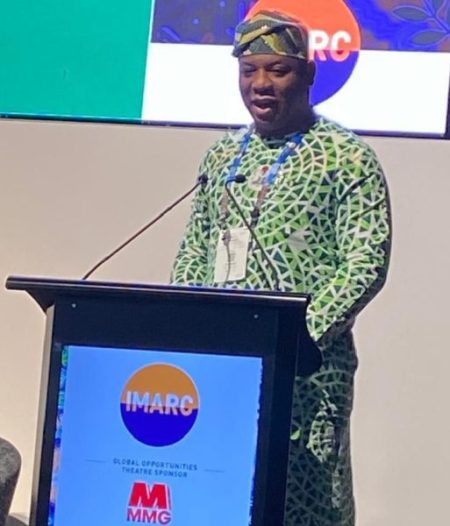30 April 2015, Lagos – Nigerians are sharply divided over the removal of fuel subsidy in the 2015 budget. While some okayed the move arguing that it would help the government address the problems in the oil sector, others said removing fuel subsidy without consultation with stakeholders and putting cushioning measures in place would hurt the citizenry.
Subsidy removal will help re-assess state of refineries — Olugbemi
Speaking on the issue, the Managing Director and Chief Executive Officer, First Registrars Nigeria Limited, Mr. Bayo Olugbemi, expressed support for the removal of fuel subsidy, stating that it would present an opportunity to re-assess the state of the country’s refineries.
“The price of crude oil in the international market has come down considerably. This in effect means there may be no need for subsidy payment at all. This will also be an incentive for the incoming government to re-assess the state of our refineries with a view to commencing local refining of petroleum products again,” he argued.
Lot of scam around subsidy in Nigeria — Esele
To Comrade Peter Esele, former President-General, Trade Union Congress (TUC), Nigeria’s fuel subsidy regime is riddled with inconsistencies.
His words: “The issues we need to address are what should be the actual amount of fuel and what is the actual consumption at any point in time? There is no clear cut data to support subsidy approvals. For example, what is the actual consumption of fuel in the country? Consumption level is supposed to differ at certain periods of the year. For instance, consumption level is supposed to be higher in December than in other periods of the year because large number of people are moving around, travelling from one point to the other.
“But in Nigeria, especially on subsidy, the consumption pattern is flat, same figure is allocated for December and January, in fact, same figure is allocated throughout the year, without recourse to changes in consumption pattern at certain periods in time. We also need to ask, how much is the actual cost so we can know how much the country is to pay? They said the Federal Government owes oil marketers about N350 billion; how come about this debt? How come we owe this much?
From all this, we can see that there is a lot of scam around the subsidy issue and this should be addressed quickly before it hurts the country. The incoming administration can do a supplementary budget for subsidy if they feel differently about it.”
We need a holistic approach — Omare
Comrade Eric Omare, Spokesman Ijaw Youth Council (IYC) worldwide, said: “I think total removal of subsidy should not be done suddenly but done in consultation with relevant stakeholders putting in place relevant measures to curb the resultant effect occasioned by the new price. Though, I think the outgoing government should have allowed the incoming government to handle this issue since they already have a stand on the issue. In summary, any approach to be adopted by government must be holistic.”
Oil subsidy a burden on govt –LCCI
The President of the Lagos Chamber of Commerce and Industry (LCCI), Mr. Remi Bello stated that petrol subsidy is the biggest burden on government treasury in the country.
“Besides, the global oil price dropping to below $50 per barrel there is no longer any justification for budgetary provisions for petroleum products subsidy,” he said, adding that the current economic conditions portend profound challenges for the private sector.
It will hurt Nigerians, says Joe- Odumakin
President of the Campaign for Democracy, CD, Dr Joe- Odumakin faulted the move saying that Nigerians will suffer for the removal.
Odumakin, who is also the President of Women Arise, said: “We have always said that removing fuel subsidy without making necessary cushioning effect will be like putting the cart before the horse. We said during our rallies that what was done then was subsidizing corruption. We said corruption should be removed from the fuel subsidy scheme and that corruption should be killed and not kill Nigerians.
Noting that the refineries have not been made to work, there is no adequate provisions for subsidy removal and those found culpable in the fuel subsidy scam have not been totally brought to book, she said: “Nigerians will suffer that excruciating pain if subsidy is abruptly removed and that is why I said that all the things that need to be put in place should have been put in place before the removal. It is not about the passage of the law, it is about making adequate arrangement for subsidy. It is the masses that will suffer.”
IPMAN okays subsidy removal
Chairman, Independent Petroleum Marketers Association of Nigeria, Mosinmi depot, Adeleke Bada threw his weight behind the removal of subsidy from the 2015 budget by the Federal Government.
Arguing that the action would not lead to instant increase in pump price of fuel, he said the removal would enable the Federal Government stop stealing in the industry.
According to him, it also means that the government wants to really sanitise the downstream sector of oil industry. “If all parameters are put in place in the industry for example, optimal usage of the refineries, depots and pipelines, the pump price of petroleum products will reduce. If our refineries are working very well, there would not be a reason for us to import. I subscribe to the removal.”
It’ll hike the pains of the masses— Agoro
In like manner, Chairman of the National a Action Council, NAC, Dr Olapade Agoro, said: “I have always said that Nigerian politicians have sinister purposes behind anything they do. It is too late in the day for the National Assembly to remove the subsidy. At least, they should have left it for the incoming administration rather than making things difficult.”
We do not know their justification because as it is now, the fuel importers are holding the nation in the jugular because this current administration only has a few days to go. I have always said that Nigerians are for themselves because the removal will hike the pains of the masses.”
Lekan Balogun, Oduyoye speak
Also, Ibadan High Chief and chieftain of the Peoples Democratic Party (PDP), Senator Lekan Balogun said if it was true that subsidy had been removed, it was a very bad move that could have serious implication on the citizenry.
He said it was unthinkable that the subsidy could be removed without putting any measure in place to cushion its effects on Nigerians.
Also, a former two-time member of the House of Representatives, Mr. Babatunde Oduyoye said Prof. Tam David West had spoken some weeks ago about the fuel subsidy issue and he (Oduyoye) said the fuel subsidy was becoming a fraudulent thing.
“It is wrong. How can an oil producing country like Nigeria be importing fuel? All we need is functional refineries both private and public. Once this is put in place the issue of subsidy removal would not be felt. But talking about the subsidy being removed from the budget, I think it is not right for the Senate to have passed the budget without making necessary consultations,”
Deregulation is the answer –Olawore
For Femi Olawore, the Executive Secretary, Major Oil Marketers Association of Nigeria (MOMAN), deregulation is the answer to the problems associated with the downstream sub-sector. According to him, “The removal of fuel subsidy and introduction of full deregulation of the downstream sector will bring efficiency to the sector and end the perennial fuel crisis. The perennial cycle of fuel scarcity could be blamed on discrepancies in subsidy payments and delay in the passage of the Petroleum Industry Bill (PIB) by the National Assembly.
It is meant to enrich a few –Barry Esimone
Also speaking on the issue, Mr. Barry Esimone, an engineer and President, Crusteam, an energy and infrastructure Group said subsidy enriches a few Nigerians.
“I support complete removal of subsidy. Subsidy went on its own when oil prices started to fall. I expected the Federal Government to have completely stopped the issue of subsidy once falling oil prices were being experienced. Subsidy is for the purpose of creating avenue for a few people to become rich. The government officials use it as a platform to enrich themselves. In the international market, subsidy is seen to have been wiped out. Nigeria should walk away from it and face the consequences. If the government is interested in reducing the pump price of petrol, our refineries should be put in order, or if they are not working, they should be sold to private investors. This will go a mile into reducing the deficit. Our petrol goes into other West African Countries. The inability of Nigeria Customs to curb petrol products smuggling should be checked. We cannot be pretending. Failure of the government to do the needful should not encourage the irregular to be regular,” he said.
It is a distraction –Martins
On his part, the Director, Strategic Planning, Research Intelligent, Mr. Olubunmi Martins, said: “The 2015 budget obviously will have to be revised by the incoming government, not necessarily in order to re-introduce subsidy but as to tool to drive its programmes. “Subsidy is both a moral burden and a distraction to everyone in Nigeria, and there is no better time than now, to abrogate it. Unfortunately, the Jonathan administration ought to have allowed the incoming administration the prerogative of taking a decision on the matter.
“Subsidy, depending on its circumstance and its management, is not exactly a bad policy but, successive governments in Nigeria perverted the rationale underlying the subsidy concept. It has become a dirty word and has lost its essence as a tool for social re-engineering.
“It is quite safe to speculate that the incoming government will do better for the economy and the Nigerian people without getting involved in subsidy. Subsidy undermines credibility in our environment and should be avoided,” he maintained.
In January 2015, when crude oil price dropped to a five-year low level of $47.23 per barrel, government refused to cash in on the situation and remove fuel subsidy.
Rather, it chose to announce a marginal reduction in retail price of fuel from N97 to N87 per litre. The outgoing administration would be remembered for paying the highest fuel subsidy bill in the country’s history, from about N356 billion in 2011 to about N2.7 trillion in 2013. The administration’s attempt to cut fuel subsidy in January 2012 resulted in nationwide crisis that crippled the country’s economy for a week.
– Vanguard



